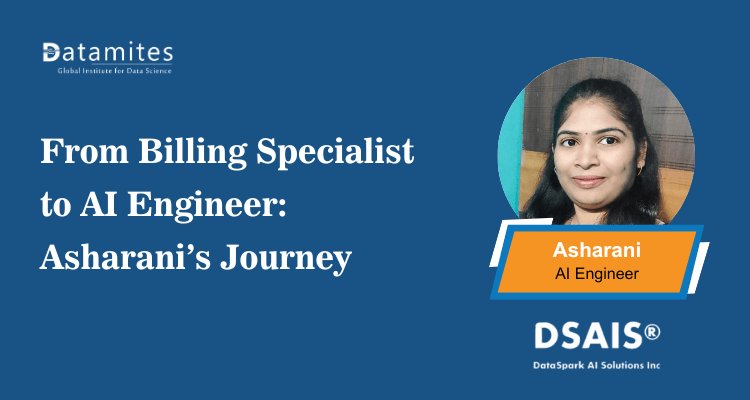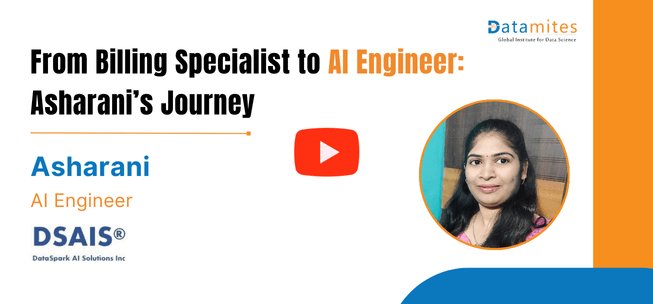Asharani’s Success Story: From Billing Specialist to AI/ML Engineer
Discover Asharani’s inspiring journey from a billing specialist to a skilled AI/ML engineer. Learn how determination, learning, and AI expertise transformed her career and opened new opportunities in the tech industry.

Imagine spending years in a role that doesn’t ignite your passion, only to finally take the leap into a field you’ve always dreamed of. This is the inspiring journey of Asharani, who transitioned from working as a medical billing specialist to becoming a skilled AI and ML engineer. Her story is a testament to perseverance, continuous learning, and the power of following your passion proving that it’s never too late to reinvent your career and thrive in the fast-paced world of data science and artificial intelligence.
Asha’s journey from career change to AI/ML Engineer: An exclusive Q&A
In this exclusive Q&A, she shares her challenges, learnings, and tips for anyone looking to reinvent their career in data science and AI.
Q1: Can you introduce yourself, Asha?
Sure! My name is Asharani, and I’m from Bagalkote district. I have been working for the last 7 years, mostly in healthcare, focusing on medical billing and administration. I completed my engineering in Electronics and Communication, followed by an M.Tech in Signal Processing and Image Processing.
Initially, I got stuck in a non-technical role due to work commitments and the COVID-19 lockdown, which delayed my transition into my desired technical career. However, I always wanted to work in a technical field, leveraging my mathematics and programming skills.
Q2: What motivated you to restart your career in data science?
I’ve always been inclined towards science, technology, and mathematics. Despite working in a different domain for several years, I always craved to come back to my core technical roots. I realized one day that I had to take control of my career, so I joined Datamites to pursue data science and AI, resigned from my previous job, and fully focused on building my technical skills.
Q3: How did your engineering background help you in this transition?
My engineering in electronics gave me a solid foundation in mathematics and logical thinking, which is essential for data science. During my M.Tech, I also enjoyed programming and mathematical analysis, which made learning Python and understanding machine learning concepts easier for me.
Q4: How was learning Python for you?
Initially, learning Python seemed easy, but the real challenge came when I had to troubleshoot errors and work on projects. That’s when I realized that practical problem-solving is crucial. Overcoming these challenges made programming enjoyable and strengthened my confidence.
Q5: Can you share your journey at Datamites?
Absolutely! I joined Datamites while still working in rotational shifts, so attending weekday classes was difficult. I opted for weekend offline classes and relied heavily on the LMS platform for revisions. After resigning from my job, I dedicated full time to revising concepts, completing assessments, projects, and mock interviews.
It was a long process, but my determination to learn and excel in data science helped me stay focused.
Q6: How did you manage your time while working and learning simultaneously?
It was challenging because I worked over 10 hours daily as a Quality Analyst. I leveraged weekends and the LMS for practice and revision. After resigning, I took a break to refresh mentally, then focused entirely on data science, machine learning, and AI, step by step.
I strongly believe that without mastering the basics, you cannot feel confident in the subject, so I invested time in understanding concepts thoroughly before moving on to advanced topics.
Q7: What kind of questions did you face during interviews?
Most of the interviews covered basic questions and communication skills. Scenario-based questions were also common; almost every interview had at least one. Some interviews required problem-solving on the spot, which tested both logical thinking and technical knowledge.
Q8: How many interviews did you attend before getting placed?
I attended more than 10–15 interviews. Each interview was a different experience. Some required completing a project, while others had general knowledge questions. Sometimes I cleared only the initial rounds, while other times I went through multiple rounds. It taught me that luck and preparation both matter.
Q9: Which interview was the most difficult for you?
The toughest one was with Horizon. They gave me a dataset and asked me to complete a project in just two hours. Another challenging interview required writing the entire workflow and code on paper before executing it on a laptop. It tested problem-solving, logical thinking, and understanding of concepts rather than just programming skills.
Q10: What is the duration of the training program?
Typically, the program lasts around 6–8 months, including classroom training and project work. Depending on individual dedication, some may complete it sooner or take additional time for practice.
Q11: Is it easier for freshers to get into data science?
Yes, from my observations, freshers often get selected faster. Companies prefer hiring fresh talent who can learn and adapt while building their own solutions. Experienced candidates face tougher competition, but domain knowledge can be an advantage.
Q12: Can you tell us about your current role?
I am now working as an AI and ML Engineer. The interview process was easier for me after practicing thoroughly and revising concepts multiple times. My role involves applying machine learning algorithms, data analysis, and solving AI-related problems.
Q13: What advice would you give to professionals restarting their careers in AI and data science?
Restarting your career can be challenging but rewarding. A few key takeaways:
- Focus on the basics: Don’t rush. Strong fundamentals build confidence.
- Practice consistently: Troubleshooting and hands-on projects are crucial.
- Time management: Use available resources like LMS and weekend classes efficiently.
- Be determined: Sometimes taking risks, like resigning from a job, may be necessary to pursue your dream career.
Refer these below articles:
- From Fresher to AI Developer: Shreya’s Inspiring Journey
- Shaping the Future with AI: Insights from Vamsi
- Lukmanul's Path in AI Engineering
Key Insights from Asharani’s Journey to Becoming an AI/ML Engineer
Explore the inspiring journey of Asharani, who successfully transitioned from a non-technical role to a skilled AI and ML Engineer.
- Career Background: Asha worked for 7 years in healthcare, primarily in medical billing and administration, before transitioning to AI and ML.
- Educational Foundation: She holds an Electronics and Communication Engineering degree and an M.Tech in Signal & Image Processing, which provided strong foundations in mathematics, programming, and logical thinking.
- Motivation for Career Change: Asha was driven by her passion for science, technology, and mathematics, and wanted to return to her technical roots.
- Python Learning: Learning Python was manageable, but practical problem-solving and troubleshooting posed real challenges. Overcoming these strengthened her confidence.
- Training at Datamites: She utilized weekend offline classes and the LMS platform for learning while managing work. After resigning, she dedicated full time to mastering data science, completing assessments, projects, and mock interviews.
Read these below articles:
- Generative Adversarial Networks (GANs)
- What Is Vertex Artificial Intelligence?
- What is Simple Linear Regression
Asha’s journey demonstrates that with determination, careful planning, and continuous learning, it is possible to successfully restart a career in data science and AI even after spending years in a different field. Her experience serves as motivation for anyone seeking a transition into technology, highlighting the value of strong fundamentals, hands-on skills, and persistence. According to MarketsandMarkets, the global chatbot market was valued at USD 5.4 billion in 2023 and is projected to grow to USD 15.5 billion by 2028, at a CAGR of 23.3% during the forecast period.
Pune has emerged as a major technology hub in India, witnessing remarkable advancements in Artificial Intelligence (AI) and Machine Learning (ML). Supported by a strong academic ecosystem, the presence of leading IT companies, and a thriving startup community, the city is fostering rapid adoption of these cutting-edge technologies. In this environment, Artificial Intelligence courses in Pune are equipping learners with the skills needed to contribute to and shape the future of AI-driven industries.
DataMites is a premier training institute offering specialized programs in Artificial Intelligence, Machine Learning, Data Science, and related technologies. Learners gain globally recognized certifications through accreditations from IABAC and NASSCOM FutureSkills, along with extensive placement support that includes resume preparation, mock interviews, and access to strong industry networks. The DataMites Artificial Intelligence Course in Bangalore is delivered through training centers in Kudlu Gate, BTM Layout, and Marathahalli, with both online and classroom learning options available to meet diverse learner requirements.

